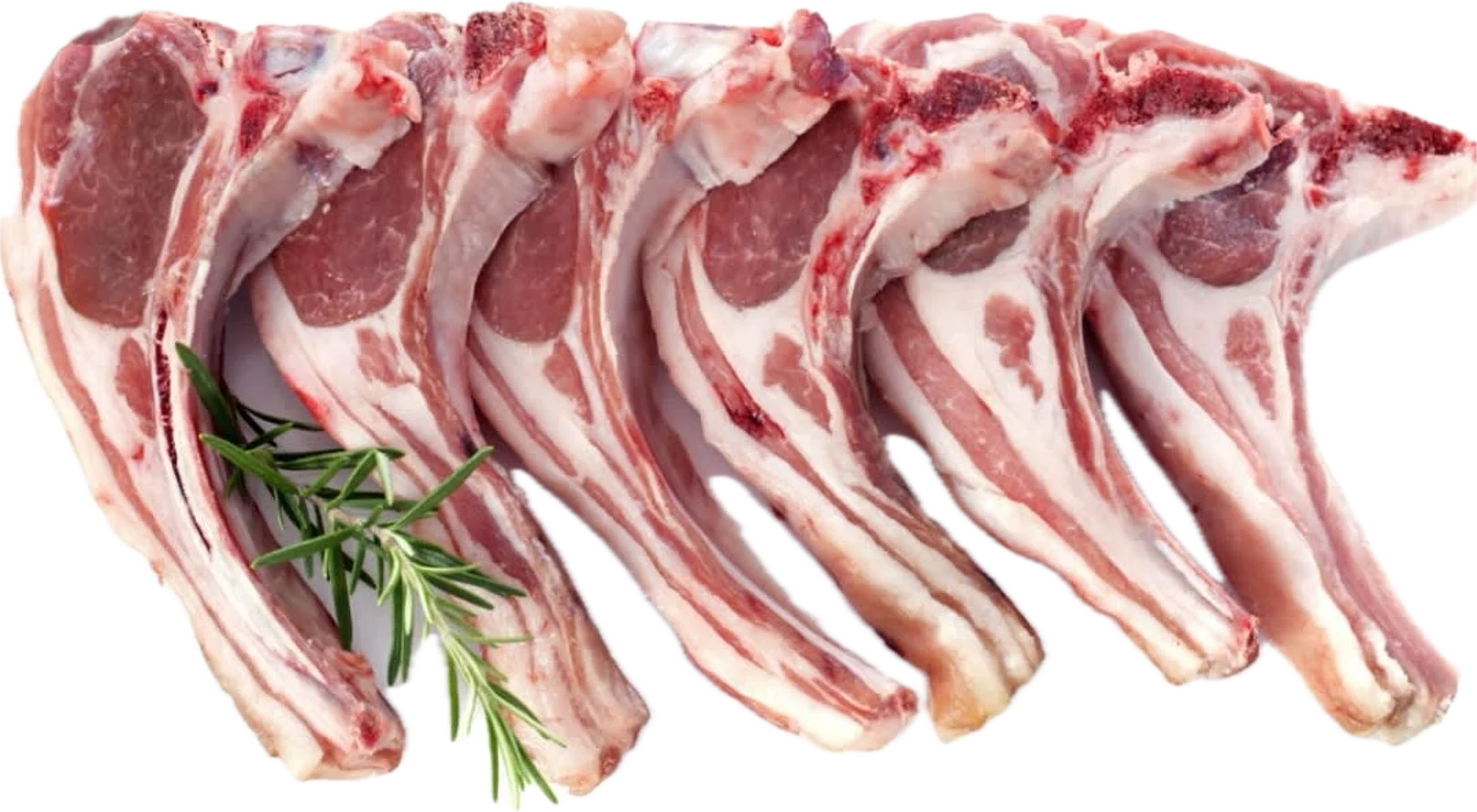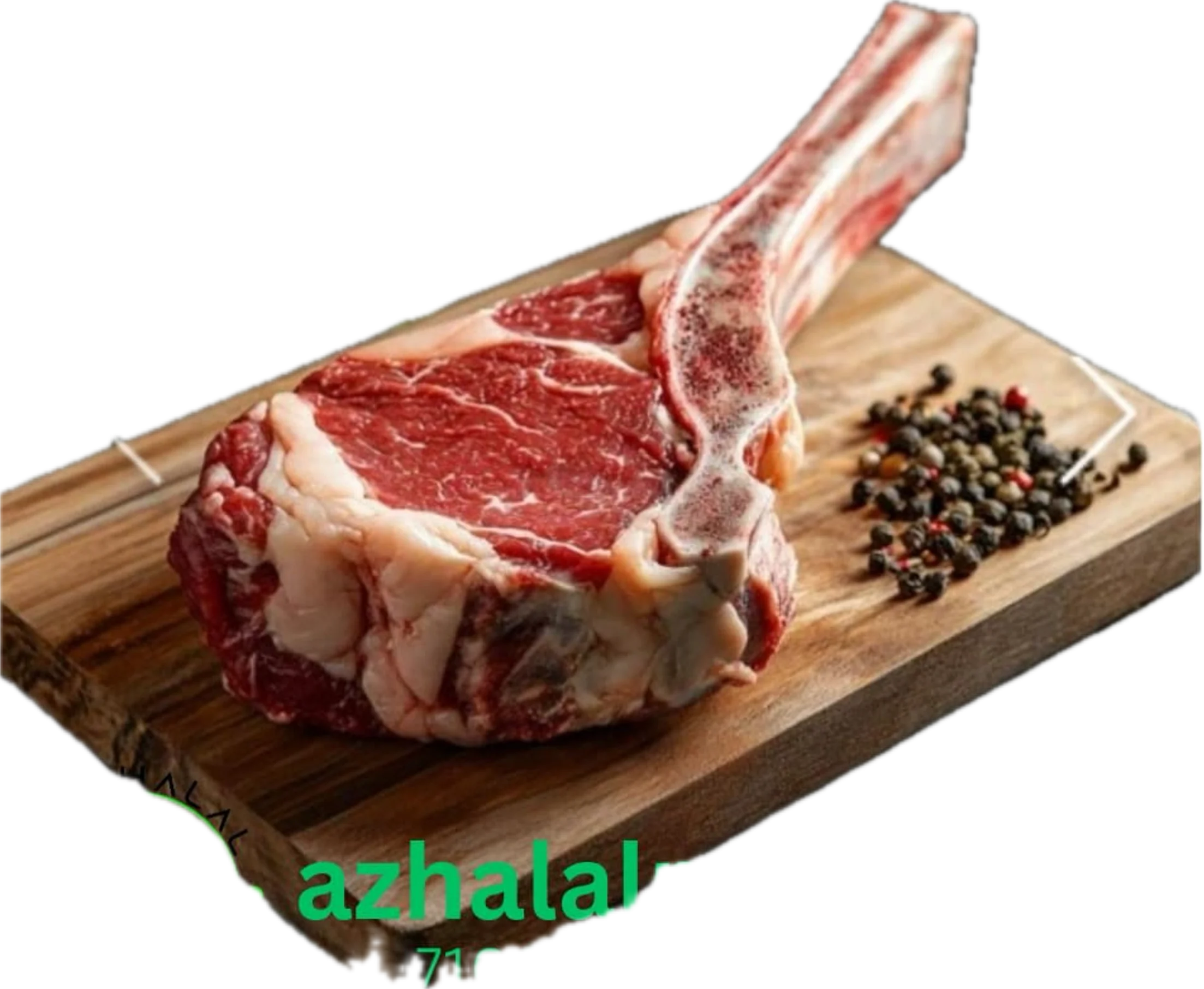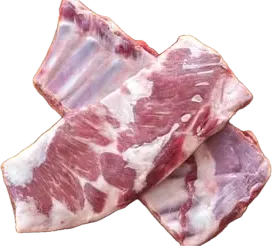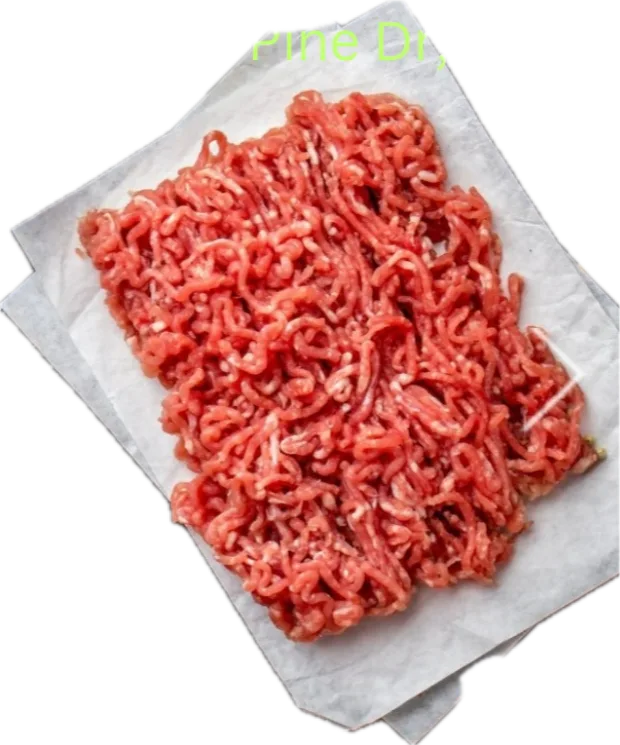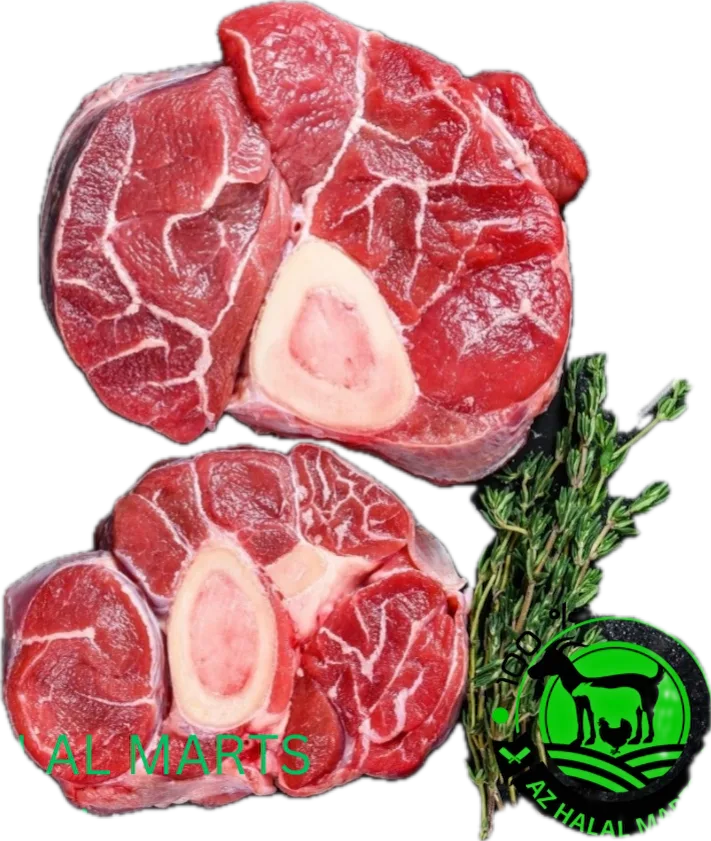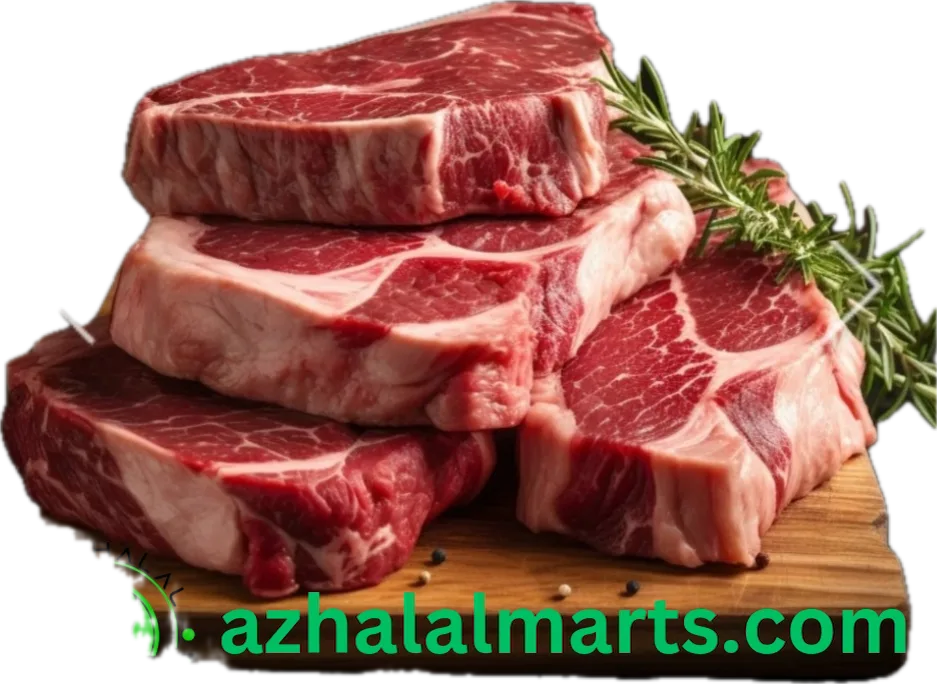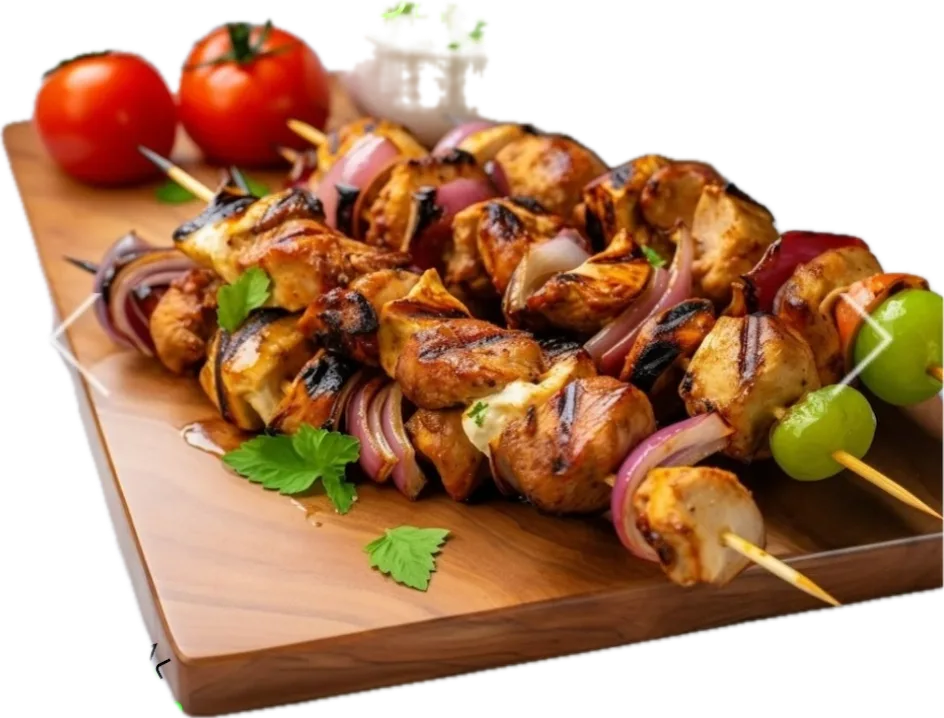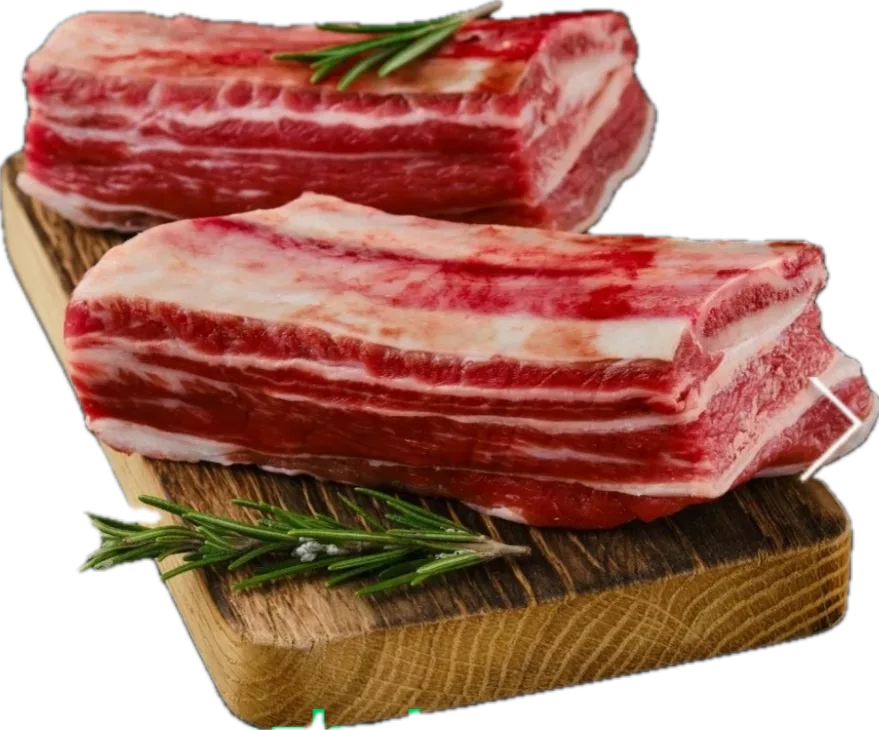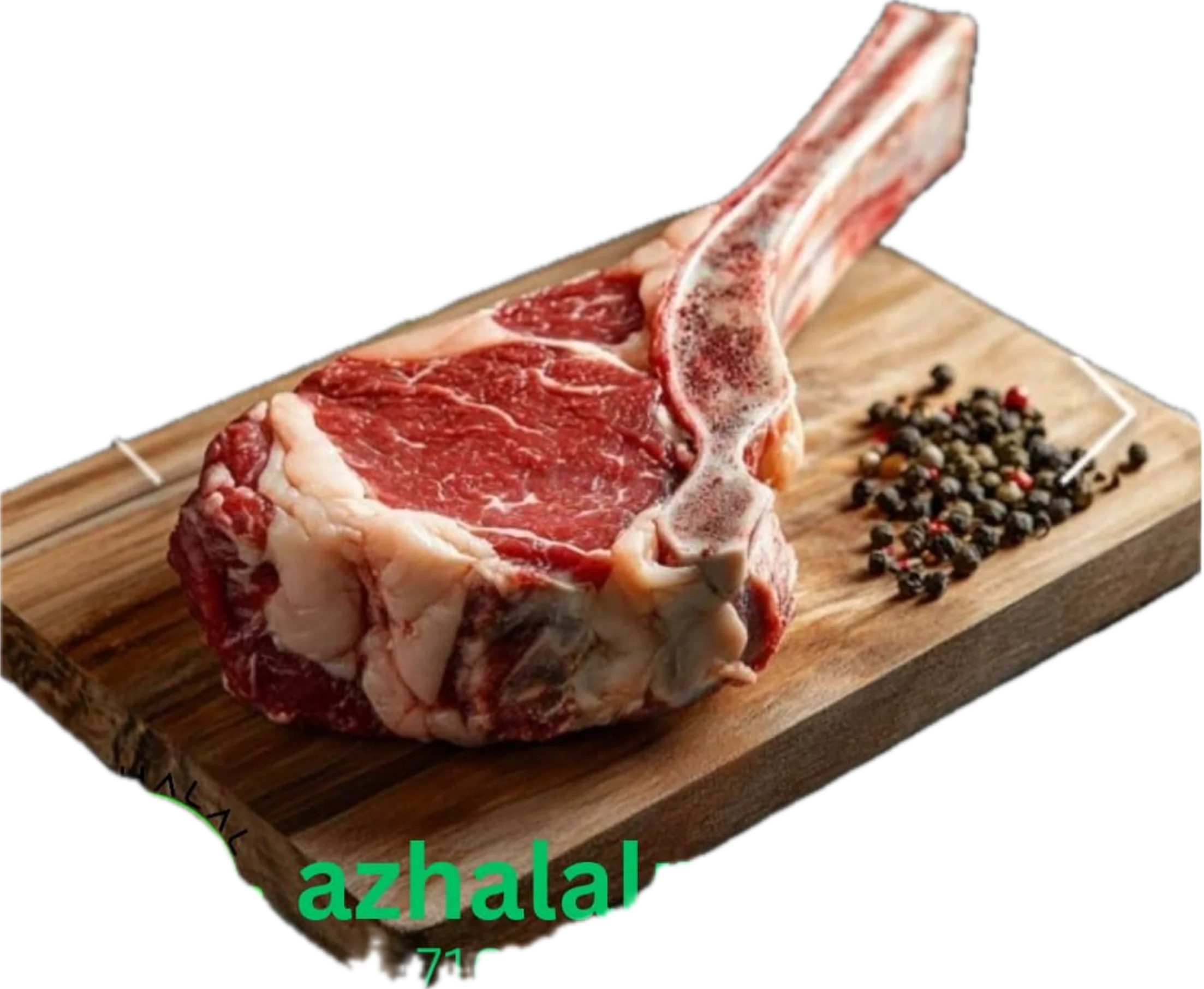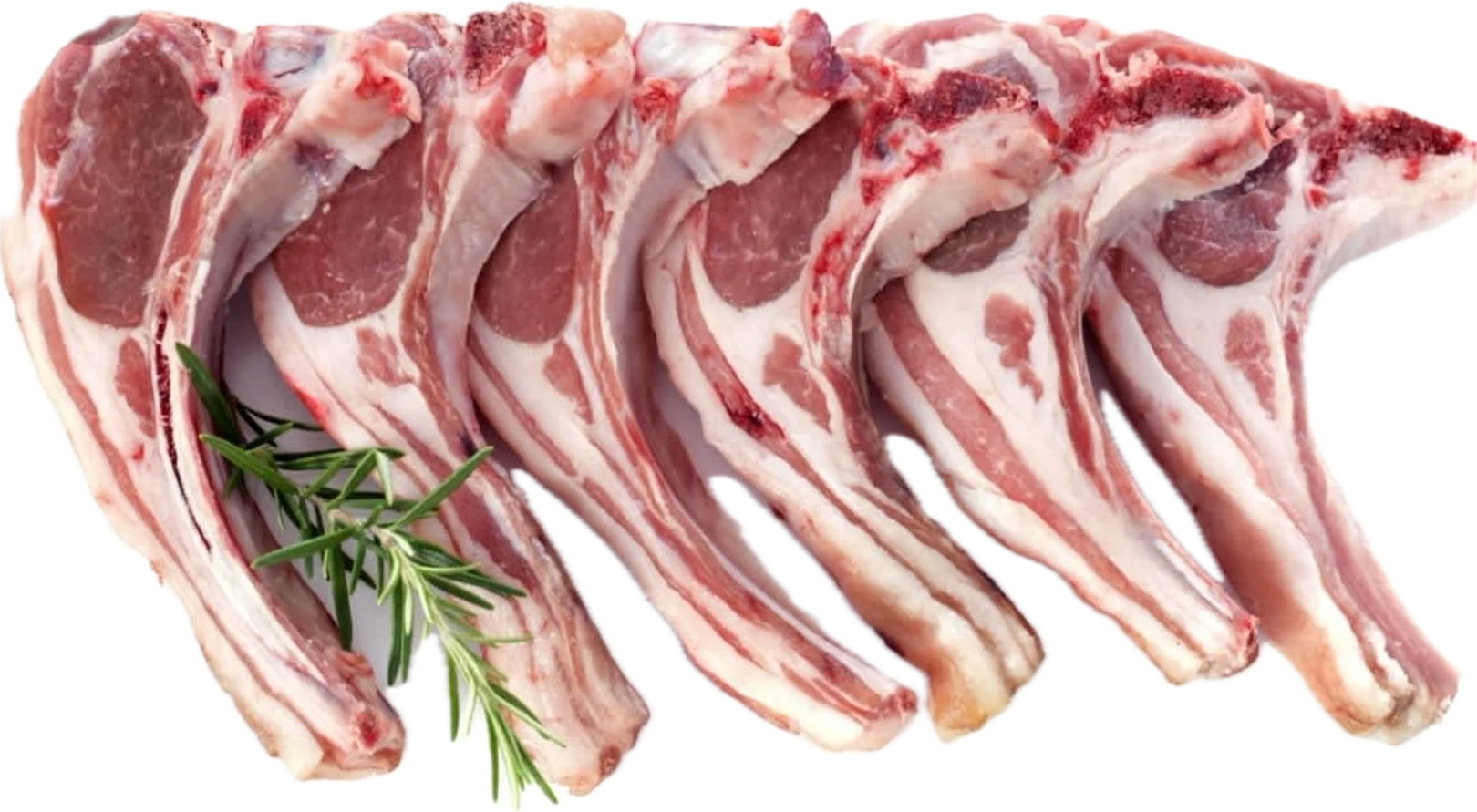

Fresh To Order
All dishes are made fresh to order, ensuring you get a perfect experience every time.

delivery or pick up
Enjoy the convenience of fast delivery to your doorstep or quick, easy pickup from our shop.

Quality Ingredients
We pride ourselves on using only high-quality ingredients, from dough to fresh toppings.


What Say Our Clients
Customer Reviews

CARY's Best
About AZ HALAL MARTS
AZ Halal Marts in Cary, NC is your go-to destination for top-quality halal meat. Our butchery, grocery, and retail store offers a wide selection of products, with popular items like T-bone steak and Rib-eye steak. Whether you're looking for fresh cuts or specialty items, we've got you covered. Visit us today for all your halal meat needs!
ORDER NOW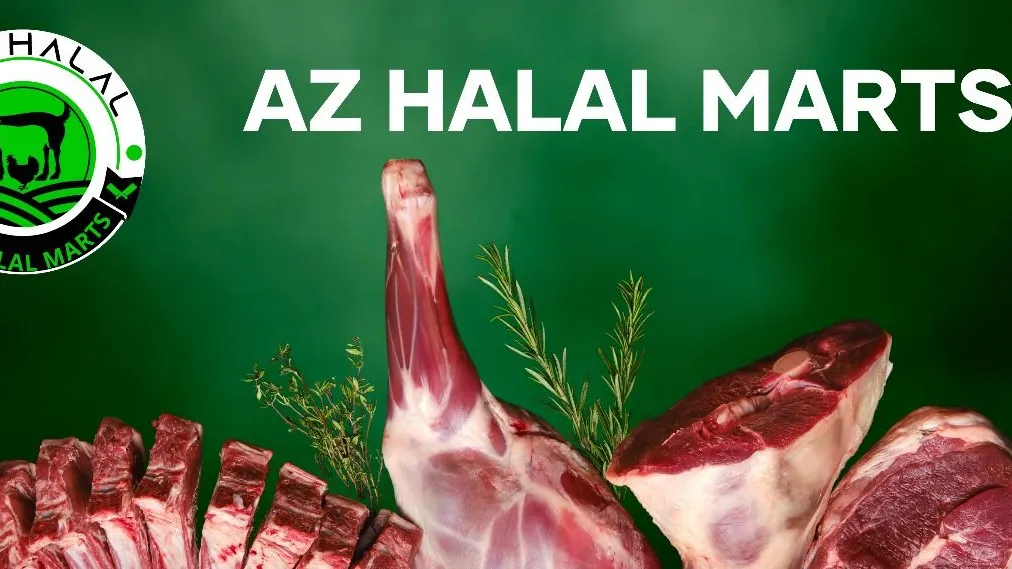
CARY's Best
Recipes

Goat biryani is a flavorful, aromatic rice dish that combines tender goat meat with basmati rice, spices, and herbs. Here’s a simple recipe to help you make it at home:
Ingredients
For the Goat Marinade:
1 lb goat meat (preferably with bone)
1 cup yogurt
1 tbsp ginger-garlic paste
1 tsp turmeric powder
1 tsp red chili powder
1 tsp cumin powder
Salt to taste
1 tbsp lemon juice
For the Rice:
2 cups basmati rice
4-5 cups water
1 bay leaf
4-5 cloves
1-inch cinnamon stick
2-3 green cardamom pods
Salt to taste
For the Biryani:
2 large onions, thinly sliced
1 large tomato, chopped
1-2 green chilies, slit lengthwise
1/4 cup chopped fresh cilantro
1/4 cup fresh mint leaves
1 tsp garam masala powder
1/2 tsp saffron strands soaked in warm milk
3 tbsp ghee or oil
Instructions
- 1. Marinate the Goat: In a large bowl, mix the goat meat with yogurt, ginger-garlic paste, turmeric powder, red chili powder, cumin powder, salt, and lemon juice. Cover and marinate for at least 1 hour, or overnight for best results.
- 2. Cook the Rice: Rinse the basmati rice and soak it for 30 minutes. Boil water with bay leaf, cloves, cinnamon, cardamom, and salt. Add rice and cook until it’s about 70% done. Drain and set aside.
- 3. Prepare the Biryani Base: In a large pan, heat ghee or oil. Fry the sliced onions until golden brown, setting aside a portion for garnish. Add marinated goat meat and cook until the meat is tender and the oil separates. Add chopped tomatoes and green chilies, cooking until tomatoes are soft. Add cilantro, mint, and garam masala powder.
- 4. Layering and Dum Cooking: In a heavy-bottomed pot, layer half the rice, then add the cooked goat mixture. Top with the remaining rice. Drizzle saffron milk over the rice and garnish with the fried onions, cilantro, and mint. Cover the pot with a tight-fitting lid and cook on low heat for 20-25 minutes (dum cooking) until the rice and meat are fully cooked and infused with flavors.
- 5. Serve: Gently mix the biryani and serve hot with raita or a side salad. Enjoy your goat biryani!
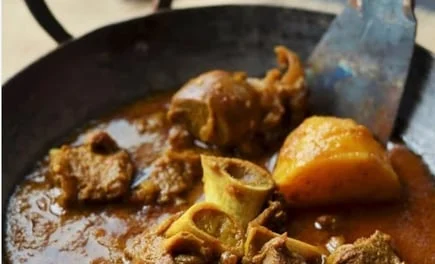
Goat meat curry
Goat Curry Recipe
Ingredients
1.5 lbs goat meat, cut into pieces
2 onions, finely chopped
2 tomatoes, chopped
1 cup yogurt
3 tbsp oil
2 cloves garlic, minced
1-inch ginger, minced
Fresh cilantro (for garnish)
Spices
2 tsp cumin seeds
1 tsp turmeric powder
1 tsp red chili powder
2 tsp coriander powder
1/2 tsp garam masala
Salt to taste
Instructions
- 1. Marinate goat with yogurt, turmeric, chili powder, and salt for 30 minutes.
- 2. Sauté Onions: Heat oil, add cumin seeds, and then onions. Cook until golden.
- 3. Add Aromatics: Stir in garlic and ginger for 1 minute.
- 4. Cook Tomatoes: Add tomatoes and coriander powder; cook until soft.
- 5. Add Meat: Mix in goat, cover, and cook for 10 minutes.
- 6. Simmer: Add 1-2 cups water, cover, and simmer for 45 minutes until tender.
- 7. Finish: Sprinkle garam masala, garnish with cilantro, and serve with rice or naan.
CARY's Best
Blog
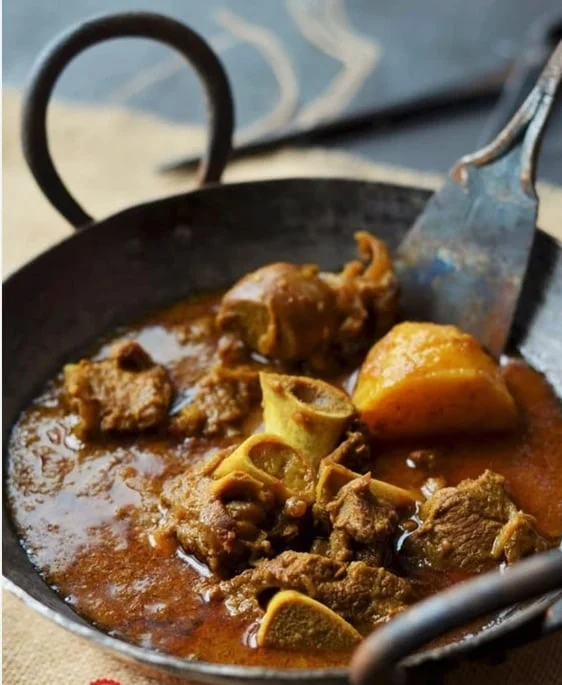
Goat curry
Goat Curry Recipe
Ingredients
1.5 lbs goat meat, cut into pieces
2 onions, finely chopped
2 tomatoes, chopped
1 cup yogurt
3 tbsp oil
2 cloves garlic, minced
1-inch ginger, minced
Fresh cilantro (for garnish)
Spices
2 tsp cumin seeds
1 tsp turmeric powder
1 tsp red chili powder
2 tsp coriander powder
1/2 tsp garam masala
Salt to taste
Instructions
- 1. Marinate goat with yogurt, turmeric, chili powder, and salt for 30 minutes.
- 2. Sauté Onions: Heat oil, add cumin seeds, and then onions. Cook until golden.
- 3. Add Aromatics: Stir in garlic and ginger for 1 minute.
- 4. Cook Tomatoes: Add tomatoes and coriander powder; cook until soft. 5. Add Meat: Mix in goat, cover, and cook for 10 minutes.
- 5. Add Meat: Mix in goat, cover, and cook for 10 minutes.
- 6. Simmer: Add 1-2 cups water, cover, and simmer for 45 minutes until tender.
- 7. Finish: Sprinkle garam masala, garnish with cilantro, and serve with rice or naan.
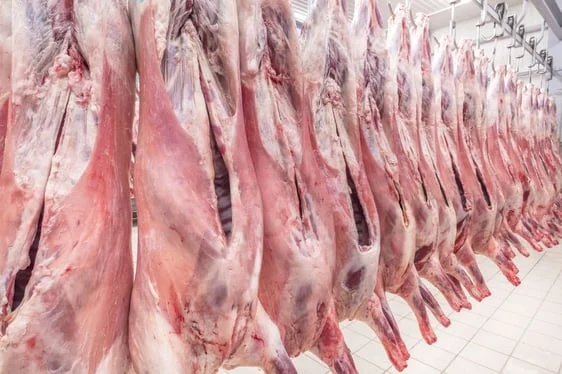
Why Choose Halal Meat? Understanding the Benefits and Quality
1. What Makes Halal Meat Different?
Halal meat is prepared according to Islamic law, ensuring humane treatment. Animals are calm, healthy, and slaughtered in a way that reduces suffering and allows thorough blood drainage, which enhances cleanliness.
2. Health Benefits
Halal meat has reduced bacteria levels due to blood drainage, lowering contamination risk. This process may also remove toxins, providing cleaner, high-quality protein that supports health.
3. Ethics and Animal Welfare
Halal standards prioritize humane treatment and respect for animals, making halal a conscientious choice aligned with modern ethical values.
4. Our Quality Commitment at AZ Halal Marts
Fresh Selection: Goat, lamb, chicken, and beef are sourced for freshness.
Strict Standards: Rigorous checks ensure premium quality.
Affordable Pricing and Delivery: We offer fair prices, bulk discounts, and free delivery within 5 miles.

Comparing Halal and Non-Halal meat - What's The Difference?
Posted on October 4, 2024
As our society continues to grow and evolve, so do our dietary choices and preferences. In a bustling community such as Morrisville, there is a rich variety of culinary traditions and nutritional practices that have become an integral part of daily life. One of the most significant dietary considerations for many people is whether their food is halal or non-halal. This is a topic that has sparked much discussion and debate, particularly in recent years. So, what exactly is the difference between halal and non-halal meat? Is there a significant impact on our health and well-being? These are just some of the questions that we will explore in this article. In the following sections, we will delve deeper into the concept of halal and non-halal meat, discussing their origins, differences, and potential implications. By the end of this article, you will have a better understanding of this topic and why it's relevant in today's society.
Foundations of Halal and Non-Halal Meat
A key aspect of understanding the nuances between halal vs non-halal meat involves the Islamic dietary guidelines, which are central to this distinction. Halal, an Arabic term meaning "permissible," refers to food that is allowed under Islamic law as defined in the Quran. Conversely, foods that are not permissible are termed haram. The guidelines are not simply religious mandates; they form a comprehensive way to ensure ethical and clean food sourcing. The preparation of halal meat, in particular, must adhere to specific criteria, including the method of slaughter. The animal must be alive and healthy at the time of slaughter, and the slaughter itself must be performed in the name of Allah by a Muslim. This method, called dhabh, ensures the swift and humane extraction of blood, a process believed to minimize the suffering of the animal and enhance the cleanliness of the meat. Non-halal meat, in contrast, may not follow these specific criteria regarding the welfare of the animal during slaughter, nor the invocation of Allah’s name, which is a pivotal step in halal preparation. Moreover, when examining the differences between halal and non-halal practices, the ethical sourcing and treatment of animals in halal meat preparation stand out. Animals must be treated with respect and care throughout their lives, ensuring their freedom from undue stress or harm. This principle is crucial to halal meat and extends into farming practices, where humane treatment is expected. You might find this approach quite distinct compared to some non-halal practices where such considerations may not be as rigorous or consistent. For many Muslims and non-Muslims alike, this focus on humane treatment resonates with broader ethical concerns about animal welfare and environmental sustainability.
The Process and Requirements of Halal Slaughter
The process of halal slaughter is not just about meeting religious requirements, but it also involves significant care and precision. From the treatment of the animal throughout its life to the final steps of preparation, there are various key ideas to understand.
1. Ethical Treatment of Animals
First and foremost, halal philosophy emphasizes the ethical treatment of animals. This involves ensuring that the animal is healthy and treated with kindness throughout its life. From birth, respect and dignity are reinforced, making this a cornerstone of halal principles. This not only aligns with religious mandates, but it also reflects the values of compassion and empathy towards animals.
2. The Process of Slaughter
When it comes time for slaughter, the process called dhabh is carried out. This involves a trained Muslim performing the act swiftly and precisely with a very sharp knife. The goal is to minimize discomfort for the animal. The cut is made across the throat, severing the jugular veins and carotid artery while leaving the spinal cord intact. This allows for quick and humane draining of blood from the body. Such attention to detail is crucial, as it not only adheres to religious mandates but also ensures that the meat is clean and free from most blood, which is considered impure.
3. The Role of Prayer in Halal Slaughter
To be compliant with halal food preparation, the utterance of a prayer, or tasmiyah, is an essential part of the process. This prayer acknowledges the life being taken and grants permission from Allah for the animal's use. The significance of this practice lies in its aim to imbue the process with gratitude and humility. By invoking Allah’s name, the act of slaughter is transformed into one of mindful purpose. This adds a layer of reverence that is often absent in non-halal procedures, which may focus solely on efficiency and output without considering the spiritual aspect.
4. Monitoring and Regulation
To ensure full compliance with halal methodologies, monitoring and regulation by certifying bodies are essential. These organizations oversee the entire halal preparation process to confirm that all guidelines are meticulously followed. This provides a layer of trust that is absent in non-halal settings, where adherence to halal-specific ethical standards is not required. This oversight reassures consumers through clear labeling and certifications, aiding them in making informed choices. It is worth noting the rigor with which these bodies function, ensuring that every stage, from sourcing to slaughter to sale, is transparent and accountable.
Permissibility and Restrictions in Muslim Dietary Practices
Muslim dietary practices go far beyond simple food choices. The concept of halal represents a deeply ingrained way of life, intertwined with faith, culture, and social values. These practices shape daily habits and reflect a commitment to both spiritual and physical well-being. For many, observing halal is not only about following religious edicts but is also seen as an act of worship, bringing meaning and purpose to every meal.
1. Purity and Ethical Consumption
The principle of purity is fundamental in halal practices, extending beyond religious edicts to ethical and humane treatment of animals. Halal meat production involves meticulous processes, ensuring animals are raised and slaughtered in accordance with stringent standards that prioritize both welfare and cleanliness. This thorough approach appeals to a growing number of people outside the Muslim community who are increasingly conscious of sustainable and ethical food sourcing. The emphasis on purity also extends to physical health, as halal guidelines encourage consuming food that promotes well-being, both physically and spiritually. This transparency and accountability in food production have made halal products popular with consumers who value ethics in their diet.
2. Halal as a Lifestyle and Cultural Practice
Halal practices transcend dietary restrictions, creating a holistic lifestyle centered around integrity, mindfulness, and respect for creation. For Muslims, consuming halal food is an essential component of maintaining religious integrity and following spiritual guidelines, yet it has also become a cultural practice that fosters connections with family and community. Increasingly, halal is being adopted by people who view it as a commitment to ethical consumption, sustainability, and mindfulness. This practice encourages a conscious lifestyle that aligns with values of responsibility and care for the environment, while also respecting religious principles.
3. Cultural Sensitivity and Inclusivity
In multicultural societies, dietary customs like halal provide an opportunity for fostering respect and understanding among diverse groups. Halal practices offer more than religious adherence—they promote inclusivity by encouraging conversations around cultural sensitivities. This understanding allows communities to build stronger bonds, as awareness and appreciation for different practices grow. By respecting these dietary laws, misconceptions can be dispelled, promoting greater harmony in society. Additionally, halal practices encourage people to share their cultural and religious traditions, contributing to a deeper sense of inclusion, unity, and compassion across diverse backgrounds. This recognition of dietary diversity enhances both personal and communal connections, reinforcing the idea that food can be a bridge to mutual respect and understanding.
Health Benefits and Considerations of Halal Meat
One particularly remarkable facet of halal dietary practices is the embrace of halal meat health benefits, which frequently attract attention for their nutritional value and strict ethical standards. Health-conscious individuals often gravitate towards halal meat, acknowledging how these practices ensure meats are devoid of hygienic concerns, given their rigorous processing and focus on cleanliness from slaughter through preparation. One can appreciate how the thorough draining of blood from the animal, a hallmark of halal methods, notably reduces the risk of harmful bacteria and disease transmission that might otherwise occur. This aspect underpins why many regard halal meat not simply as a religious observance but also as a choice favoring overall health and well-being. Furthermore, the focus on animal well-being throughout its life resonates with broader consumer preferences for sustainably sourced food that reflects compassionate practices. Encapsulating the halal framework further, halal dietary restrictions exclude ingredients like non-halal animal fat, where potential risks linger in unmanaged consumption and environmental impacts. The exclusion of such fats is not only religiously stipulated but equally appreciated for its alignment with health benefits. Many in the culinary world recognize that consuming meats with reduced levels of saturated fats—which is a natural consequence of adhering to halal dietary principles—can support heart health and prevent disorders linked to fatty deposits in arteries. It's enlightening to realize how those deeply committed to halal principles are often aligning their choices with some modern dietary recommendations, emphasizing moderate intake of unhealthy fats within contemporary health standards. While some may view these guidelines as strictly faith-based, it is essential to recognize their dual role in enhancing physical health alongside spiritual purity. Hygiene and dietary sanctity are pivotal, as halal meat must remain uncontaminated by haram elements, reinforcing trust among consumers who prefer meats without ambiguity in their sources or practices. Sharing the advantages of halal principles extends beyond personal health benefits to encompass environmental and community health considerations. By supporting farms and brands practicing organic and humane farming methods, halal consumers contribute to healthier ecosystems and promote sustainable agricultural practices. The decrease in industrialized farming's negative externalities—such as waste and pollution—aligns with consumption of halal products that emphasize natural and mindful use of resources. Consequently, such practices foster a robust local economy around businesses that champion these standards, encouraging community growth and ethical employment opportunities. As you might recognize, engaging with communities that appreciate and uphold the humane treatment of animals promotes collective advancement in ethical standards which resonate well across diverse and multicultural environments.
Wrapping Up
Halal dietary practices hold significant meaning for Muslims, blending faith, culture, and ethical consumption into one comprehensive approach. The focus on purity and humane treatment of animals resonates beyond religious communities, appealing to those who prioritize ethical and sustainable choices in their food. When selecting halal sources, it is important to seek out reputable suppliers who adhere strictly to halal guidelines. Look for certified labels from recognized halal certifying bodies, which ensure that the entire process—from farming to slaughter—is in compliance with Islamic principles. Another important aspect when choosing halal meat is transparency. Reliable halal sources will openly share information about their sourcing methods, animal welfare practices, and preparation standards. Visiting local halal markets or farms that are known for their ethical practices is a good way to support trusted sources. Additionally, many suppliers now provide detailed information online, making it easier for consumers to verify the integrity of their products. By prioritizing certified halal sources, consumers can trust that they are making choices that respect religious traditions, promote animal welfare, and align with a conscientious approach to food. This consideration enriches both personal and communal well-being, fostering respect and harmony through shared values in dietary practices. Presenting AZHARI HALAL SHOP Welcome to Azhari Halal Shop, your trusted family-owned business conveniently located at 716 Slash Pine Dr, Cary 27519. We specialize in providing a diverse range of halal-certified meats, groceries, and household essentials to meet the needs of our community. Each product we offer is carefully sourced to ensure quality, freshness, and adherence to halal standards, bringing you a shopping experience you can trust. We take pride in sourcing our meats from local farms, ensuring they are always fresh, flavorful, and free from harmful chemicals or preservatives. Our commitment to quality extends beyond our meat selection; we also offer a variety of spices, herbs, and pantry staples, making us your one-stop shop for all your halal groceries and household essentials. Experience the superior quality of our halal goat back leg, perfect for roasting or slow cooking. It guarantees tenderness and flavor, making it an ideal choice for any meal. Sourced with care and prepared in accordance with halal guidelines, this cut promises melt-in-your-mouth goodness. For inquiries or to place an order, contact us at +1 (919) 244-8634 or email us at [email protected].

How Halal Products Can Improve Your Overall Health?
Posted on October 3, 2024
When it comes to taking care of our health, we often focus on things like exercise and medication. However, one often overlooked aspect is our diet and the food choices we make. But did you know that incorporating halal products into your diet can actually have a positive impact on your overall health? Halal products are not just limited to meat and poultry; they also include fruits, vegetables, grains, and dairy products that are certified as permissible according to Islamic dietary laws. By following halal dietary practices, you are not only ensuring that your food is prepared in a clean and ethical manner, but you are also making mindful food choices. This can lead to a healthier and more balanced diet, which in turn can have a positive impact on your overall well-being. That's why in this article, we will talk about the benefits of incorporating halal products into your lifestyle and how it can improve your health in more ways than one.
Understanding the Health Benefits of Halal Food
Understanding the core principles of halal dietary practices provides insight into why halal foods might be beneficial to your health. Halal, which means "permissible" in Arabic, is a term that signifies more than just a mode of preparation or a restriction in diet; it reflects a holistic approach to consumption and ethics. At the heart of this practice lies the belief that food should not only nourish the body but also the soul. Key principles include ensuring that the food is clean, free from harmful substances, and prepared in a hygienic manner. Animals must be healthy at the time of slaughter, ensuring quality meat. This meticulous process contributes significantly to the health benefits of halal food. Cleanliness and purity in food preparation not only promote physical well-being but also foster spiritual clarity. By adhering to these rigorous standards, consumers can enjoy a diet that prioritizes both nutrient integrity and ethical grounding. Moreover, halal food preparation significantly contributes to the health benefits you can experience. The preparation process mandates that animals are treated with respect and slaughtered humanely by a Muslim who invokes the name of Allah at the time of slaughter. This is not just an expression of faith, but a practice that ensures the animal is calm and free of stress, which can alter the quality of the meat. Stress in animals can lead to the release of hormones such as adrenaline, which can negatively affect taste and meat quality. This focus on the humane treatment of animals is uncommon in many conventional meat preparation practices but is central to the halal way, ensuring that you receive high-quality, clean meat free from impurities. The commitment to ensuring food is free from toxins and impurities is a crucial part of halal dietary practices. This principle limits the consumption of foods and ingredients that could potentially detriment health. For instance, the consumption of blood is prohibited, as the body should not be burdened with the potential diseases and toxins it might carry. Trans fats and unidentified animal fats, often found in processed foods, are also generally avoided in halal diets. These restrictions may naturally lead halal consumers to healthier eating patterns, inadvertently reducing the risk of chronic illnesses such as heart disease and high cholesterol associated with such ingredients.
Exploring the Quality of Halal Meat
The concept of halal meat quality goes beyond religious mandates and delves into the practices that define its standards. Certified through rigorous examinations, halal meat stands apart due to its quality assurance process.
1. Slaughtering Practices for Optimal Quality
Halal certification ensures that the meat you consume has passed through multiple checks for hygiene, health, and ethical treatment of animals. This includes the way the animal is raised, ensuring it is nourished on a healthy, ethical diet, free from chemicals and confined stress conditions. These high standards are maintained throughout the entire process, from rearing practices to humane slaughtering methods, to processing and packaging. This meticulous approach ensures that you receive meat that is not only ethically sound but also nutritionally balanced, promoting a healthy diet and lifestyle.
2. The Link Between Halal Certification and a Healthy Diet
The halal certification not only assures faith-based adherence but also guarantees that the meat fulfills health standards that align perfectly with the principles of a nutritious diet. This means that by consuming halal meat, you are not only meeting religious requirements but also supporting your body's needs. Halal practices emphasize prevention against diseases triggered by consumption of tainted or unethical foods, effectively curbing potential health risks. Additionally, the restrictions on animal feed and hormone usage in halal meat production decrease exposure to hazardous chemicals, promoting a healthier and more natural diet.
3. The Rigorous Process Behind Halal Meat Quality
The halal certification process involves strict audits throughout the meat production line, from the farm to your plate. This ensures that animals are not factory-farmed or exposed to cruel practices, which can reduce meat quality through stress-induced toxins. The focus on cleanliness and sanitation protocols also mitigates the risk of contamination, allowing you to enjoy the purity and natural flavor of the meat. This holistic approach to halal standards, which integrates spiritual mindfulness and conscientious eating, sets it apart from many mainstream fast-consumption patterns that are often riddled with unhealthy additives and questionable sourcing.
4. The Benefits of Ethical Consumption
Halal practices not only prioritize the health of the consumer but also promote ethical food consumption. By choosing halal meat, you are supporting a dining experience that respects nature and humane considerations. This approach emphasizes prevention against diseases triggered by consumption of tainted or unethical foods, effectively curbing potential health risks. Additionally, the holistic approach of halal standards naturally promotes a healthier and more sustainable way of life for both individuals and communities.
Animal Welfare and Disease Prevention
As we've seen, the concept of animal welfare is an essential aspect of the halal process, playing a crucial role in the overall benefits of the halal diet. It involves caring for and respecting the well-being of animals, which ultimately reflects in the quality of the meat consumed. The care and concern for animal welfare in the halal process have a direct impact on the quality of the meat produced. This is because stress and illness in livestock can lead to contamination and a decrease in nutrient-rich meat. By maintaining ethically-sourced and disease-free chickens and cattle, the halal process ensures a healthier and more nutritious product for consumption. This not only fulfills a dietary requirement, but also a pledge to provide a sustainable and health-focused product for families. Promoting Natural Rearing Conditions The halal process promotes natural rearing conditions for animals, from birth to slaughter, in alignment with health regulations. This not only promotes their well-being but also minimizes disease exposure and leads to healthier meats. By supporting animal welfare, the halal process ensures that the entire life of an animal is respected, resulting in healthier and more natural meat choices for families. The emphasis on animal welfare in halal certification goes beyond ethical considerations and has tangible effects on public health. By giving birds enough space to move and forage freely, providing access to fresh air, and avoiding non-natural enhancers and antibiotics in their diet, the risk of stress and disease is significantly reduced. This, in turn, leads to a decrease in disease outbreaks and foodborne illnesses, promoting the safety of this staple protein source and positively impacting public health outcomes. The strict adherence to high standards of animal welfare in the halal process also results in nutritional benefits for consumers. By providing stress-free living conditions and disease-free states for animals at the time of slaughter, halal meat is known to have higher levels of Omega-3 and healthier types of fats, promoting cardiovascular health and overall well-being. These nutritional differences are achieved through the dedication to animal welfare throughout the meat supply chain, making halal-certified meat a sound choice for dietary needs.
Incorporating Halal Fish and Meat in a Balanced Diet
Notably, when delving into the benefits of incorporating halal products like fish and meat into your daily meals, consider the structure and versatility of these options.
Halal Fish
Halal fish, such as halal tilapia, showcases a delicious and nutritious choice, offering an abundance of benefits essential for a healthy balanced diet. Tilapia, known for being low in calories yet high in protein, is an excellent addition to your diet without sacrificing flavor or nutrition. They abound with essential omega-3 fatty acids, crucial for heart health, cognitive function, and reducing inflammation. When you prepare halal fish dishes, you tap into a traditional source of sustenance with a contemporary advantage, as you infuse meals with the vital nutrients necessary for a well-rounded dietary plan. Regarding the preparation and use of halal fish, implementing a variety of cooking methods can enhance the nutritional intake without compromising taste. You might consider grilling or broiling the fish with a light seasoning of herbs and spices; such methods preserve the nutritional value while offering a low-fat cooking option. Serving it alongside a medley of greens or grains boosts the fiber content and maintains the integrity of a balanced meal. Additionally, steaming fish allows you to emphasize its natural flavors for a softer, more delicate dish that still supports an easily digestible, satisfying dietary selection. Using halal-certified ingredients ensures cleanliness and ethics from sourcing to plate, which increases confidence in the product's quality.
Halal Lamb
Incorporating lamb offers distinction in flavor profile and texture, which can advance the variety of your dietary regimen. Lamb's richness in minerals such as iron, zinc, and vitamin B12 contributes to energy metabolism, strengthened immune response, and improved oxygen transportation in blood, essentially supporting you in striving for overall health. When planning meals with halal lamb, consider a myriad of ways to incorporate it into traditional or modern recipes while maintaining nutritional harmony. For a mindful dietary approach, prepare lamb stew with hearty vegetables to offer warmth and nutrient density in one pot. Alternatively, slice lean lamb cuts for a vibrant salad or pita wraps brimming with seasonal greens and tangy yogurt dressing—options that suit both lunch and dinner tables. It's crucial to monitor portion sizes, integrating them into a well-rounded meal plan that avoids unnecessary excesses, effectively safeguarding against calorie overconsumption while ensuring nutritional completion.
Heritage Value
Beyond the nutritional components of halal fish and lamb, the broader dedication to ethically sourced and responsibly processed foods reflects positively on your dietary choices. This commitment extends an invitation to engage in a dining experience rooted in respect for nature and health, combining heritage value with modern dietary needs. With each halal choice, you are not only filling your pantry with ingredients but also fostering a conscientious lifestyle that underscores consumption and well-being under a unified banner. As you explore family-oriented dining made complete with halal products, remember that this shift not only nurtures physical health but also aligns with values that enrich the soul, offering a systemized positivity to meal times that resonates across generations.
Final Words
Incorporating halal products into your diet not only supports ethical eating but also contributes to a cleaner, healthier lifestyle. With a focus on quality and mindful food choices, halal-certified options like Tilapia can provide both nutritional benefits and peace of mind in knowing your meals are prepared in a respectful and wholesome manner. At Azhari Halal Shop, we are dedicated to offering a wide range of fresh, high-quality halal products, including our popular Tilapia. Our mission is to provide our customers with the finest options that meet both their dietary preferences and health goals. Whether you're looking for seafood, poultry, or meat, we strive to deliver products that are both flavorful and responsibly sourced. Ready to elevate your next meal? Treat yourself to the fresh, tender flavors of our Tilapia. Whether you're baking, frying, or steaming, this versatile fish is the perfect choice. For inquiries and to explore our extensive range of halal products, don't hesitate to reach out to us at +1 (919) 244-8634 or drop us an email at [email protected]Let your culinary explorations be guided by choices that honor health, ethics, and quality, bringing peace of mind with every meal you prepare.

